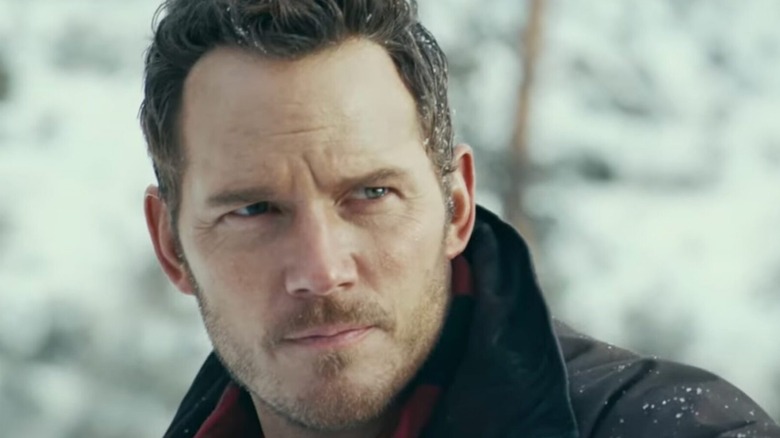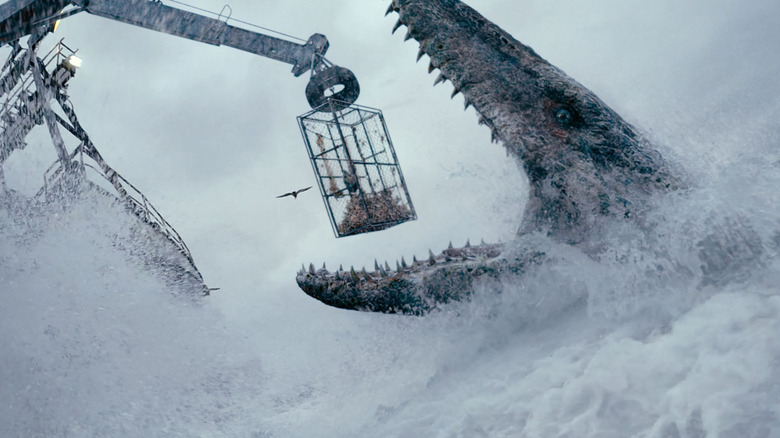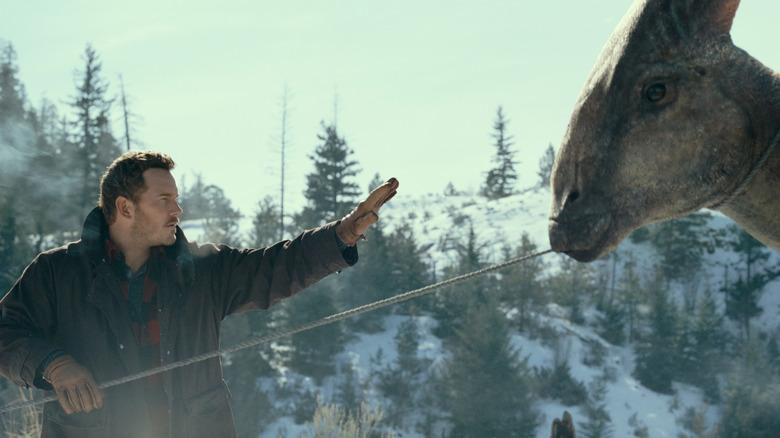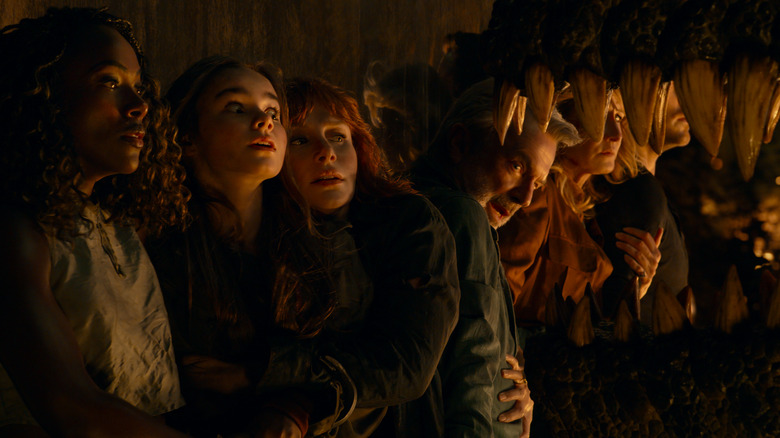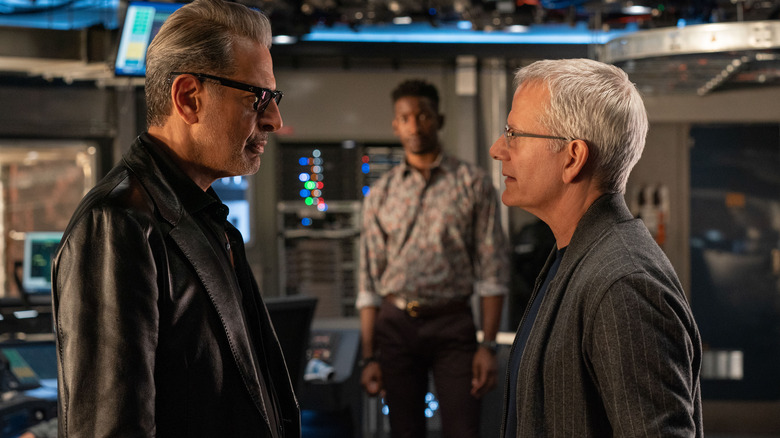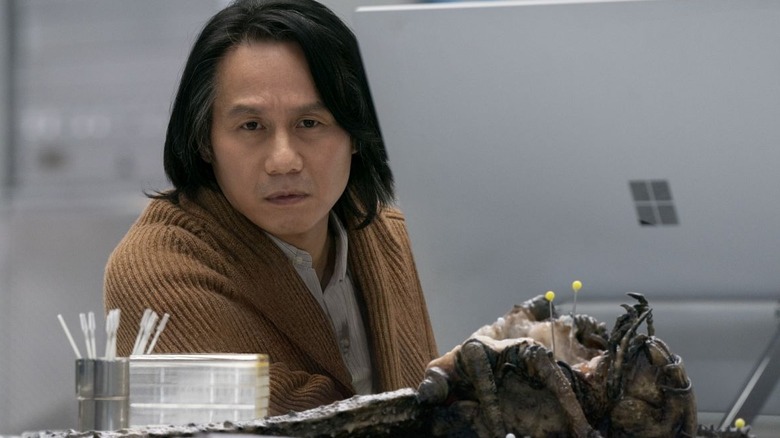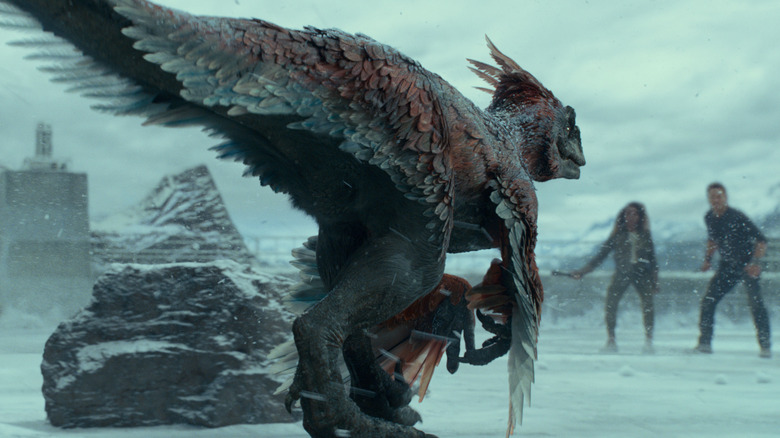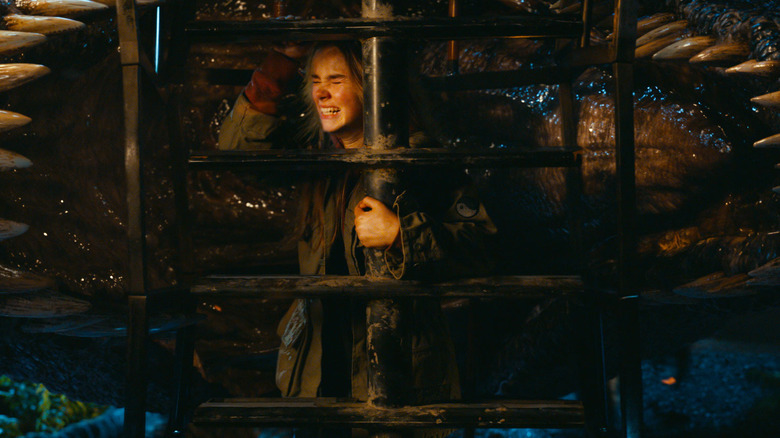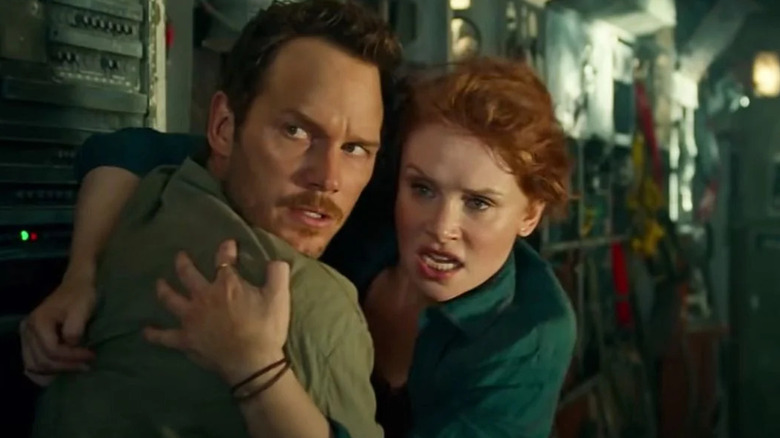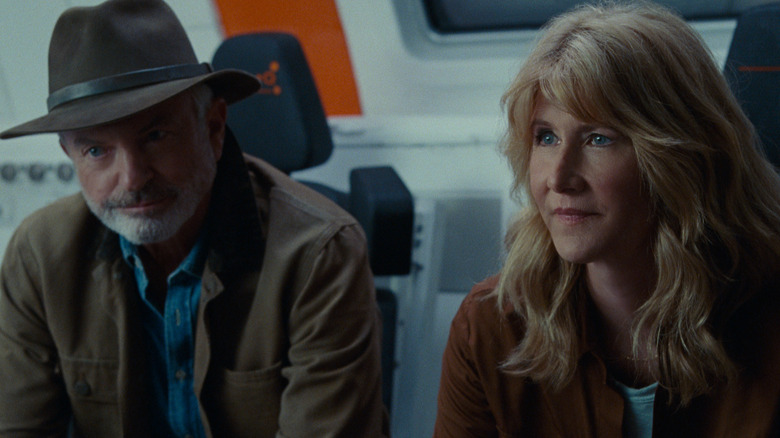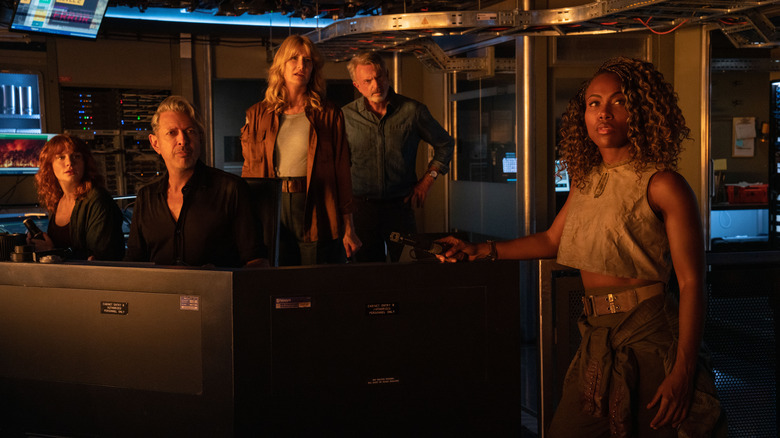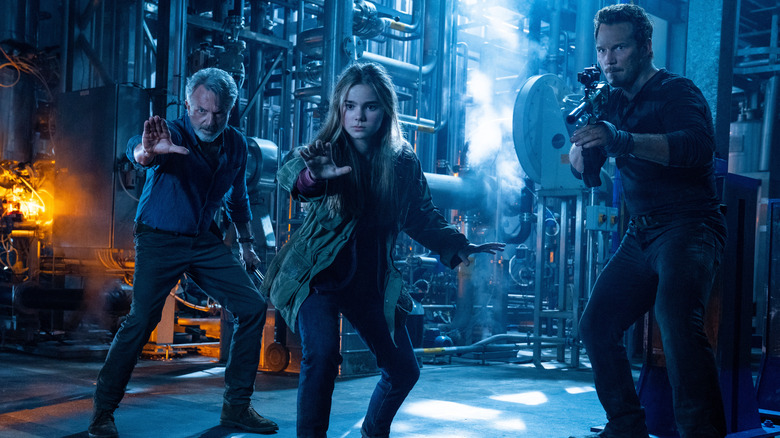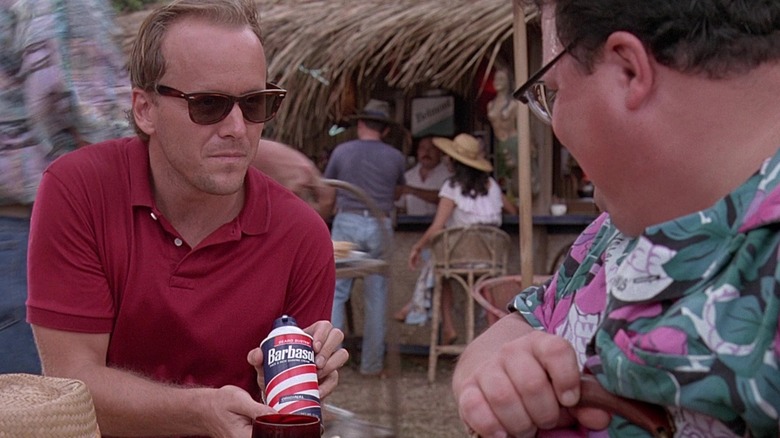Biggest Unanswered Questions In Jurassic World Dominion
"Jurassic World Dominion" is a film overflowing with big ideas, big stakes, and big action. A direct sequel to "Jurassic World: Fallen Kingdom," the film begins with the setup of a world in which dinosaurs now coexist alongside humans, creating all manner of new problems and opportunities with which people around the world have to deal. That's all before viewers learn what happens when the characters from the "Jurassic World" franchise meet up with their "Jurassic Park" counterparts, teaming on an adventure that just might decide the fate of the entire human race.
All that setup means "Dominion" is a whole lot of movie, but even its ample runtime can't cover every major theme, topic, and character beat suggested by the story. There's so much going on, in fact, that it feels like there could be a whole other movie, or even a trilogy, wrapping up what's left unsaid by the end of the film. But since those movies don't exist (yet), here's a breakdown of the biggest unanswered questions in "Jurassic World Dominion"
How does the dinosaur preserve work?
By the end of "Jurassic World Dominion," the governments of the world have decided that the remaining dinosaurs under BioSyn's care will continue living in the valley in Italy's Dolomite Mountains, which will become a natural preserve for the animals. This comes, of course, after BioSyn's fall from grace, leaving the land free and available.
What the film doesn't address, however, is exactly how that preserve will be maintained in the context of all the other dinosaurs out in the world. BioSyn was keeping their own stock of creatures on hand, sure, and the surviving dinos will be free to stay there, but what does that mean for the wild dinosaurs who've adapted to whatever climate they've settled in at this point?
Will world governments designate special teams to round up those dinosaurs and resettle them in the preserve? Will teams of dinosaur hunters do their best to group every single dinosaur together in that one patch of land? Will some dinosaurs simply be allowed to roam the wild forever as part of a larger mission of coexistence? Whether fans get a sequel or not, the implications of this preserve in the larger franchise story are fascinating.
What happens when the dinosaur population grows?
As part of its stated mission to use dinosaur DNA for research material with a variety of medicinal applications, BioSyn has set up its Dolomite valley facility as a sort of natural, free-roaming habitat for numerous dinosaur species. By the end of the film, the audience learns that those species will get to stay there, apparently living out their lives as naturally as possible in the environment they're given. It's a tidy solution to a larger problem, but it leaves some lingering questions.
This is the "Jurassic" franchise we're talking about, after all, a series of films that has lived by the edict of life finding a way. It has been well established that some of these dinosaurs can asexually reproduce, while others are clever enough to find ways around manmade restrictions. So, what happens when, through some means or another, the dinosaurs become too big for their natural enclosure? What happens when the herding technology fails or simply stops working? What happens when so many dinosaurs are packing the valley that there is no choice but to relocate some percentage of the population? If the commitment to allowing dinosaurs to coexist with humans truly is a sound one, there are still many more adjustments to be made.
What else can Maisie's DNA do?
Midway through "Dominion," it is revealed that Maisie Lockwood (Isabella Sermon) is not just a clone of the late Charlotte Lockwood, but actually her daughter, born through a means of asexual reproduction, with her genetic code corrected from Charlotte's to eliminate a congenital defect. Maisie is, therefore, the key to a puzzle involving BioSyn's swarms of genetically engineered super locusts, because her DNA could help create a pathogen that kills them.
Maisie's importance throughout "Dominion" is well established, but what viewers still don't know is what other applications her unique genetic makeup might offer. Her brilliant mother was able to create her through genetic manipulation alone, which could open up new reproductive avenues for infertile women; her unique DNA could also give scientists clues to curing any number of diseases.
So, is Maisie the Rosetta Stone for all manner of cures? Could the wonder of her existence be replicated? Is she destined to be studied for the rest of her life, all in the name of saving more people? It's up in the air, but by the time the film ends, Maisie is in the unique position of being the most valuable human being on the planet.
What else was Dodgson planning?
"Jurassic World Dominion" reintroduces the villainous Lewis Dodgson (Campbell Scott), a longtime rival of John Hammond who has now made his company, BioSyn, the biggest corporate presence in the dinosaur realm. With the help of Dr. Henry Wu (B.D. Wong), Dodgson has set up a state-of-the-art facility devoted to studying dinosaurs and their DNA. He's also, in secret, developing super locusts to devour crops around the world, with the goal of selling his own company's seeds as a locust-proof alternative.
This plan backfires, of course, and by the end of the film Dodgson is dead and his company has been exposed as corrupt. Viewers know that various major players in the film, including Alan Grant (Sam Neill) and Ellie Sattler (Laura Dern) are set to tell both Congress and the press about BioSyn's issues, but the question remains: What else was Dodgson working on? He was ambitious (and ruthless) enough to mess with food supplies, after all, so what about water supplies? What about invasive plant species to alter other ecosystems to suit his needs? The film digs deep into the problems of BioSyn, but it's also clear by the end that we've only scratched the surface of Dodgson's schemes.
What happens to Dr. Wu?
At one point late in the film, Dr. Henry Wu approaches the heroes and asks them for help, only to have Dr. Ian Malcom (Jeff Goldblum) point out that, historically, Wu has been at least one of the sources of every problem in the franchise. The legendary geneticist has had his hand in engineering just about every dangerous dino species walking the Earth at this point, so why should they trust him? Well, it turns out that Wu might be the only guy who can stop the locust plague, so they give him a hand; he stops the locust plague, and it all works out.
But ...Wu still deserves some sort of consequences for his role, doesn't he? This is a guy who spent years designing dinosaurs by fusing their DNA with various reptiles and who has now spent at least the last little while designing custom killer locusts for BioSyn.
At best, he's a dangerous man who needs to be disbarred, restricted, ostracized and/or stopped from further experimentation. At worst, he's a criminal who should be locked away.
Regardless of whether he's learned his lesson, and despite how charming and quirky BD Wong makes the character, Wu has to own up to some of those sins. The question is: How?
What about other dinosaur breeders?
By the time of "Dominion," dinosaurs have spread out around the globe, inhabiting just about every continent in some form or another and becoming either a nuisance or an outright hindrance to human life. Some see this as an opportunity and they are manipulating things for their own gain. BioSyn is front and center, of course, but there hints other people are custom-breeding dinosaurs to make them into killing machines, with poachers picking up dinosaurs for breeding purposes to sell as pets, or worse.
By the end of the film, there's a concerted effort to create a new sanctuary for the creatures, but that doesn't mean the poachers and the breeders are just going to go away. The question is, how many of them are still out there, and how far will they go in order to protect their hustle? These are capitalists who've already adapted to dinosaurs existing, so it seems unlikely they'll simply give up their piece of the pie.
Will dinosaurs still be used as weapons?
Speaking of those breeders, it's clear in "Dominion" that certain aspects of dinosaur-adjusted life from "Jurassic World: Fallen Kingdom" have only grown in the intervening years. Early in the film, we meet Santos (Dichen Lachman), a bounty hunter of sorts who's been tasked with getting her hands on Maisie for Dodgson and BioSyn. In the course of her mission, Santos introduces us to a group of specially bred raptors, trained to target anything identified by a laser pointer and hunt it.
These raptors have a relatively small role to play in the overall film, but their presence reminds us that various interests around the world are still devoted to making sure dinosaurs can be deployed as powerful weapons, something those rich, powerful people in "Fallen Kingdom" were keenly interested in. The question now, under the new status quo at the end of the film, is how far that effort will go. Will we eventually see mercenaries and even standing armies fighting alongside dinosaurs? Will larger carnivores be drafted into hunting duty? Will herbivores become beasts of burden? The longer dinosaurs exist in our world, the more likely such possibilities seem.
What happens to Claire and Owen?
Though they've continued to work with dinosaurs on their own in the years since "Fallen Kingdom," Claire (Bryce Dallas Howard) and Owen (Chris Pratt) begin "Dominion" living in relative seclusion, doing their best to help out while devoting a lot of energy to taking care of Maisie and keeping her existence a secret. The film's early scenes show us that they're struggling as her adoptive parents, not just because she's rebellious, but because they've been thrown into the roles and are still doing their best to adjust.
By the end of the film, both Claire and Owen have grown into their parental roles with Maisie. They've embraced their need to protect her in a more emotional way, and pushed themselves to new heights in their journey to get her back no matter what. They've also spent even more time around dinosaurs and proven instrumental to dismantling BioSyn. So, what do they do now?
Will they keep working with dinosaurs in a more direct way, training some of them while advocating for the safety and care of others? Will Claire's administrative gifts come back into play now that there's a sanctuary devoted entirely to dinosaurs? Will they finally get to take a break when it's clear that Maisie is no longer in danger? Whatever their future may hold, it's clear that life in hiding isn't necessarily something they have to deal with any longer.
What happens to Alan and Ellie?
The most anticipated "Dominion" element, perhaps, was a reunion of the original "Jurassic Park" stars, marking the first time in three decades that Grant, Sattler, and Malcom were all sharing the screen together. It's a big deal, and that proved especially true when it came to the development of Alan and Ellie's long-dormant relationship.
By the end of "Dominion," Alan and Ellie have once again been on a massive, dinosaur-filled adventure together, and their respective single statuses mean there's nothing in the way of a romantic reconciliation. At last, Alan Grant seems willing to settle down with the woman he loves, and Ellie is open to the kind of wandering life Alan's embraced for so long. It makes them a seemingly perfect pairing.
So, what happens now? Obviously they're both going to do some work with Congress to make sure another BioSyn can't emerge from the ashes of the film, but what's after that? Will they go back to full-on paleontology, digging up dead dinosaurs rather than studying live ones? Will they keep traveling the world, or settle in one place for quieter study? Wherever they go, it's clear they'll be together.
Has Ian's outlook changed?
A lot has changed in the time since the original "Jurassic Park" film, but one thing that has not is the philosophical outlook of Dr. Ian Malcom.
A naysayer who was convinced the dinosaur DNA project was a bad idea from the very beginning, Malcom has spent the last three decades being proven right time and again. Now, in "Dominion," he's taken a job as a corporate philosopher at BioSyn just for the hefty paycheck it provides, and is more than happy to lecture everyone about the oncoming collapse of human civilization. In Ian's eyes, our species has brought about the mechanism of its own extinction, so there's really nothing left to do but re-arrange the deck chairs on the Titanic.
By the end of "Dominion," however, there seems to be at least the appearance of hope in the world. Dr. Wu has uses his genetic prowess for good, the dinosaurs are protected, and the chance of peaceful coexistence seems imminent. With all that in mind, it's worth asking: Has Dr. Malcom's view of the world changed? Did his speech about the power of genetic manipulation and wielding it wisely make him think that perhaps the right people are finally in charge? Or is he still convinced we're doomed?
Will Maisie follow in her mother's footsteps?
Over the course of the film, Maisie Lockwood goes on a journey of self-discovery in which she learns that she's far more than just a copy of another person. She's not a clone (at least, not exactly), but rather a daughter with a real mother who not only gave birth to her, but advanced her genetic code to give her a better chance at a full life. The more Maisie learns who her mother was and what she was able to do, the more she feels like she knows herself, and the more she feels like she has a life worth living.
The question now is, what does Maisie do next? She's still interested in working with Dr. Wu, at least to the extent that she helped solve the locust problem — so, will she want to keep doing that work in the future? Will she follow in her birth mother's footsteps and become a brilliant scientist with an eye toward solving the problems of the future? Will she pursue a different field entirely? The possibilities seem endless, but it's clear that Maisie has a much deeper sense of self than she did as the film began.
How did Dodgson get the Barbasol?
Here's one for the longtime "Jurassic Park" fans. Near the end of "Dominion," as Lewis Dodgson realizes his Machiavellian machinations are crumbling, he packs up his data and beats a path out of town on a hyperloop train. At one point, he reaches for a battered, dirty old Barbasol can and puts it with the rest of his things. Fans will recognize this as a nod to his appearance in the original "Jurassic Park" film (as played by Cameron Thor), when the character gave Nedry (Wayne Knight) a Barbasol can hollowed out to hold vials for dinosaur embryos as part of his plan to steal Hammond's cloning tech.
It's a nice nod to the original film, but how did Dodgson get the can back in the first place? In "Jurassic Park," it's seemingly lost when Nedry is attacked by dinos and left to die. We watch the can get buried under an avalanche of mud, never to be seen again. Was there some sort of tracking device in it that meant Dodgson could eventually find it? Did someone just happen across it and figure out it was his? However he came to possess it once again, it's clear that little can has been through a lot.
